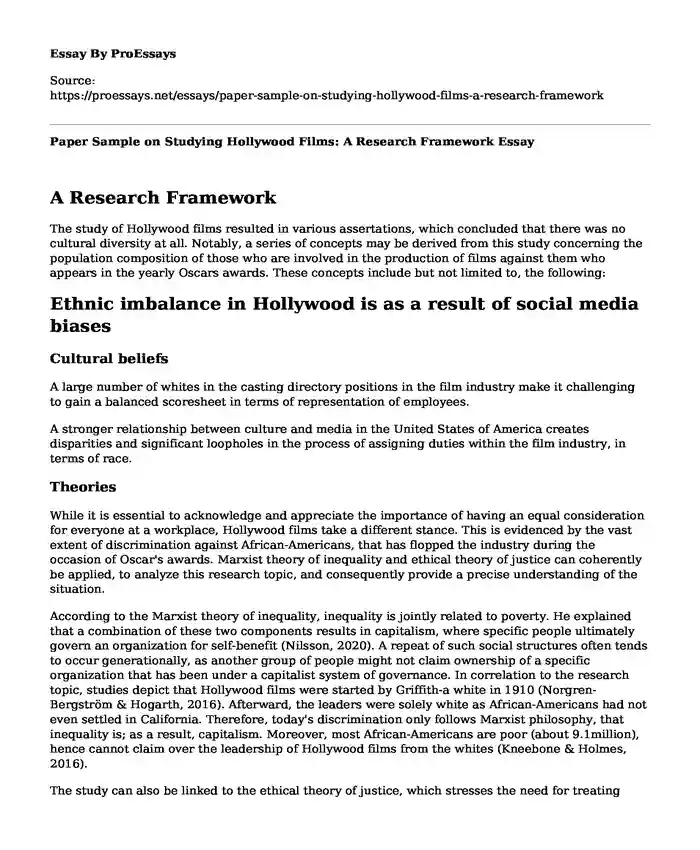A Research Framework
The study of Hollywood films resulted in various assertations, which concluded that there was no cultural diversity at all. Notably, a series of concepts may be derived from this study concerning the population composition of those who are involved in the production of films against them who appears in the yearly Oscars awards. These concepts include but not limited to, the following:
Ethnic imbalance in Hollywood is as a result of social media biases
Cultural beliefs
A large number of whites in the casting directory positions in the film industry make it challenging to gain a balanced scoresheet in terms of representation of employees.
A stronger relationship between culture and media in the United States of America creates disparities and significant loopholes in the process of assigning duties within the film industry, in terms of race.
Theories
While it is essential to acknowledge and appreciate the importance of having an equal consideration for everyone at a workplace, Hollywood films take a different stance. This is evidenced by the vast extent of discrimination against African-Americans, that has flopped the industry during the occasion of Oscar's awards. Marxist theory of inequality and ethical theory of justice can coherently be applied, to analyze this research topic, and consequently provide a precise understanding of the situation.
According to the Marxist theory of inequality, inequality is jointly related to poverty. He explained that a combination of these two components results in capitalism, where specific people ultimately govern an organization for self-benefit (Nilsson, 2020). A repeat of such social structures often tends to occur generationally, as another group of people might not claim ownership of a specific organization that has been under a capitalist system of governance. In correlation to the research topic, studies depict that Hollywood films were started by Griffith-a white in 1910 (Norgren-Bergström & Hogarth, 2016). Afterward, the leaders were solely white as African-Americans had not even settled in California. Therefore, today's discrimination only follows Marxist philosophy, that inequality is; as a result, capitalism. Moreover, most African-Americans are poor (about 9.1million), hence cannot claim over the leadership of Hollywood films from the whites (Kneebone & Holmes, 2016).
The study can also be linked to the ethical theory of justice, which stresses the need for treating everyone as equal in terms of resource allocation, governance, et cetera (Avella, 2017). The theory may be used to provide recommendations for reverting the current situation, where the American culture is considered dominant based on the fact that the founder of Hollywood was white.
Actors
In this particular research study, the major parties involved include The Hollywood Film industry, the film casting directors, social media counterparts, Oscars award competition, and the players or actors of the film, including the Africa-Americans and the white native Americans.
Variables
For this research involving Hollywood, and its extent of diversity, various components or variables are required. These include Population (African-Americans, Whites, and Casting directors); Leadership roles (social media, film industry); Culture (American culture); and Profits (Oscars award winners). These variables are categorical, to help a researcher easily understand where and how to record qualitative or quantitative findings from a particular study, for smooth analysis of the research study (Carvalho et al., 2018).
References
Avella, J. R. (2017). The dilemma of ethical leadership. Journal of Leadership Studies, 11(2), 42-44. https://onlinelibrary.wiley.com/doi/abs/10.1002/jls.21522
Carvalho, G., Amado, C., Brito, R. S., Coelho, S. T., & Leitão, J. P. (2018). Analyzing the importance of variables for sewer failure prediction. Urban Water Journal, 15(4), 338-345. https://www.tandfonline.com/doi/abs/10.1080/1573062X.2018.1459748
King, R. P. (2016). Why More Oscar Diversity Won’t Solve Hollywood’s Whiteness Problem. Contexts, 15(3), 64-66. https://journals.sagepub.com/doi/full/10.1177/1536504216662255
Kneebone, E., & Holmes, N. (2016). Concentrated poverty in the wake of the Great Recession. Brookings. https://www.housingvirginia.org/wp-content/uploads/2016/06/
Richmond-4-18-16.pdfNilsson, M. (2020). Economic inequality, Marxist theory, and Swedish-language working-class literature. Studia Neophilologica, 1-16. https://www.tandfonline.com/doi/abs/10.1080/00393274.2020.1751700
Norgren-Bergström, T., & Hogarth, C. (2016). Is Our Grasp of History a Hollywood Production; How Much History Do We Learn by Watching Films? http://www.academia.edu/download/51660105/StrongResponse.pdf.
Cite this page
Paper Sample on Studying Hollywood Films: A Research Framework. (2023, Sep 17). Retrieved from https://proessays.net/essays/paper-sample-on-studying-hollywood-films-a-research-framework
If you are the original author of this essay and no longer wish to have it published on the ProEssays website, please click below to request its removal:
- The Requirements and Production Workflow of 2K, 4K, and 8K Formats - Paper Example
- Legal and Ethical Issues in Nursing Paper Example
- How Classical Music is Still Used in Hip Pop Today? - Paper Example
- Movie Analysis Essay on War on the EPA
- Paper Example on Caravaggio Painting
- Film Analysis Essay on Better Life: Undocumented Struggles of an Immigrant Father & Son
- Young African Americans: Hopelessness and Fear in a Painting - Free Essay Example







